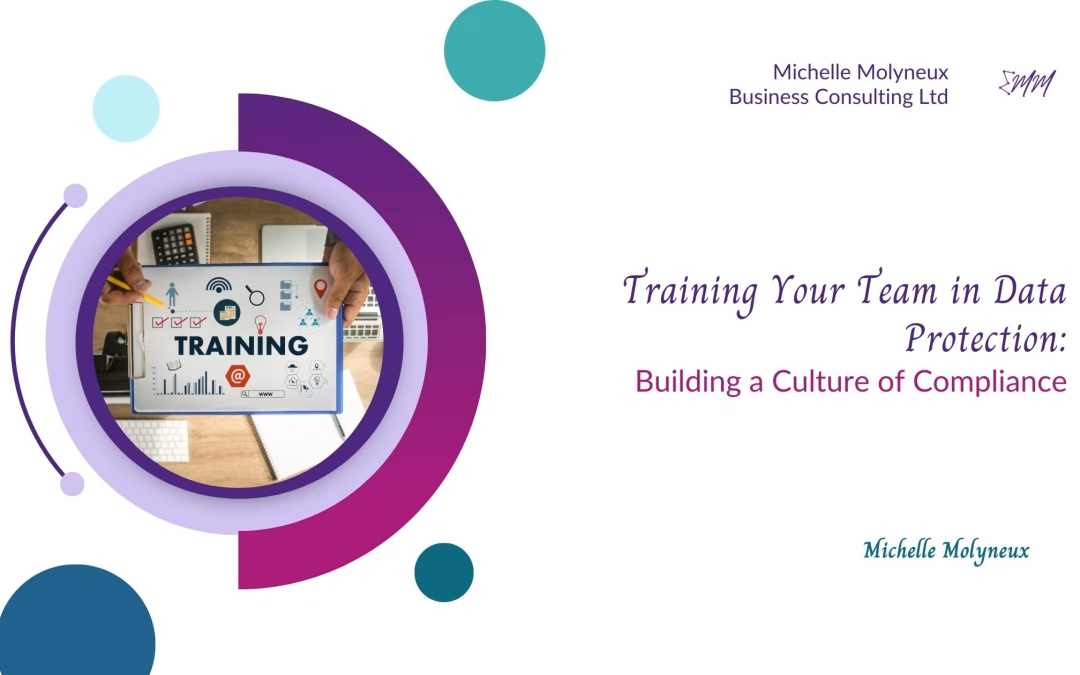As your small business grows, data protection needs to be a priority, not just for compliance reasons but for building client trust. In the service industry, you’re dealing with sensitive client information—whether it’s personal details, payment data, or confidential project insights. This means your entire team needs to be well-versed in handling personal data safely and securely. But how can you achieve that?
The key is to create a culture of compliance within your business, where every employee understands the importance of data protection and feels responsible for it. Here’s how you can do that and ensure your team is well-trained in handling data responsibly.
Create a Culture of Compliance
Building a culture of compliance means going beyond ticking regulatory boxes. It requires embedding data protection into the everyday mindset and practices of your team. Here’s how to encourage this culture:
- Lead by example: As the business owner or team leader, you set the tone. Ensure that data protection is a priority in your company by actively participating in training sessions, discussing compliance during team meetings, and referencing it in day-to-day operations.
- Regular communication: Data protection shouldn’t be only discussed during a training session. Regular communication—such as a “data protection tip of the week” or quick discussions during team meetings—keeps the topic fresh and reinforces its importance.
- Integrate data protection into everyday tasks: Encourage your team to incorporate compliance into their workflows. For example, when onboarding a new client, ensure personal data is stored securely from the beginning, or when sharing information with third-party vendors, ensure data-sharing agreements are checked for compliance.
Blended Learning Techniques for All Learning Styles
Every team member learns differently. To ensure your training program is effective, it’s important to use various teaching methods. Here’s how you can structure your training:
- Interactive workshops: Hands-on workshops where team members can ask questions and engage in discussions are among the best ways to explain complex topics like GDPR or PECR compliance. Encourage your team to bring up real-world examples of how they handle client data and discuss any potential vulnerabilities.
- On-the-job training: Not every learning moment has to be formal. Managers can provide on-the-job coaching by guiding employees through real-life situations. For example, walk through the process of responding to a data subject access request (DSAR) or teach someone how to properly handle a data breach scenario.
- Email learning series: Send bite-sized updates or tips through a weekly email series. These can be practical tips such as “How to Spot a Phishing Email” or “Why Strong Passwords Matter.” Small, digestible pieces of information help reinforce training without overwhelming your team.
- Gamification: Consider adding quizzes, challenges, or interactive simulations. For example, you could implement a “data protection champion” reward for those who consistently follow best practices or use quizzes to test knowledge retention after workshops or emails. Gamification adds an element of fun and can improve engagement with the material.
Update and Enforce Data Protection Policies
A well-drafted data protection policy is essential, but it’s only effective if everyone on your team understands it and follows it. Your policy should include clear, actionable guidelines on:
- Handling personal data: From collection to storage, outline exactly how personal data should be handled within your business. This should cover physical data (e.g., paper forms) and digital data (e.g., email communication, databases).
- Data breach response: Make sure everyone knows what to do during a data breach. This includes whom to report to, the steps involved in containing the breach, and how to communicate it to the affected individuals.
- Data sharing and third parties: Outline protocols for sharing client data with external vendors or partners. Ensure that all third parties you work with are GDPR-compliant and that data-sharing agreements are in place.
It’s also important to regularly review and update your policies to reflect any changes in regulations or your business processes. Ensure your team is informed of any updates and understands how to implement them.
Use Technology to Support Your Training Program
You don’t have to handle everything manually. There are affordable and accessible tools available to small businesses that can support your training efforts and make data protection part of everyday operations:
- Online training platforms: Tools like Moodle or Google Classroom allow you to set up courses or lessons on GDPR compliance tailored to your business’s specific needs. You can track progress, assign tasks, and offer certification for completing the training.
- Automated compliance reminders: Software like TrustArc or OneTrust can automatically remind employees to perform routine compliance tasks, such as data audits or updating privacy policies.
- Data protection tools: Use tools like LastPass for password management or encryption software to protect sensitive information. Teaching employees how to use these tools properly is part of your overall training program.
Encourage Continuous Improvement
Data protection isn’t a “one-and-done” task—it requires constant learning and improvement. Encourage a mindset of continuous improvement by:
- Regular refreshers: Schedule annual refresher courses to update your team on new data protection regulations or company processes.
- Open feedback loop: Create an environment where employees feel comfortable raising concerns or suggesting improvements to your data protection processes. This will help you stay agile and responsive to potential issues before they become problems.
- Lessons learned: When things go wrong, don’t just sweep it under the rug. Use mistakes or near-miss incidents as learning opportunities to reinforce the importance of compliance and improve your processes.
Takeaway: Training your team in data protection requires more than just handing them a policy to read. Building a culture of compliance and using a blend of interactive, ongoing learning techniques ensures your team stays engaged and well-prepared to handle sensitive data responsibly.
Have any questions? Then, please email us or book a free clarity call in
Need more guidance on how to implement these tips? Check out the ICO’s data protection guide for small businesses.
We have some other articles that you may be interested in:

